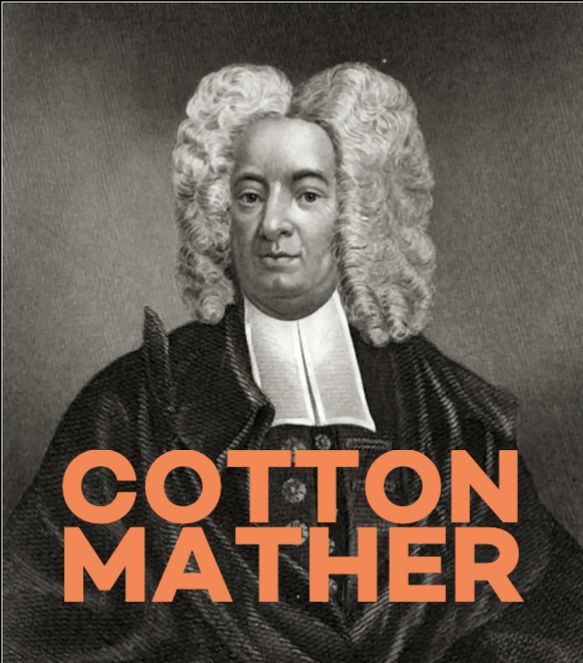Cotton Mather (1663-1729), was a third-generation American Puritan, son of Increase Mather, and grandson of John Cotton. He entered Harvard at 12 by passing the entrance exam highlighting his gifting in Latin and Greek. At the age of 18, he received his M.A. from his father, who was the president at Harvard.
Mather wrestled with his faith from a young age, at times he was so concerned about his salvation that he would appear depressed, and at other times he was ecstatic with the excitement of heaven. Regardless of his emotional state, he was noted as having a continual “conversation with heaven.” Having a speech impediment held him back from the ministry so he pursued becoming a physician, which he had a lifelong interest in. After a friend persuaded him not to view his speech limitations as a hindrance to pastoral work, he went back into religious studies. In 1680, he preached his first sermon at his father’s church from the pulpit of his grandfather. Five years later he was ordained into the ministry at his father’s church. The two developed deep bonds as father and son as well as colleagues.
Like his father, Mather was a staunch defender of Puritan orthodoxy who devoted his life to praying, preaching, writing, raising a family, and publishing. He still followed his passion for caring for others. This was seen as he encouraged some revolutionary ideas for the time: encouraging schoolmasters to reward instead of punish the student, one of his most lasting medical legacies, was in the scope of counseling, which was to show care and treatment to people who were struggling with mental illness by looking to external factors which may have attributed to the condition. His interest in the sciences made him unique among many of his American contemporaries as he was a strong advocate of a “new germ theory and inoculation against smallpox” which ran counter to many of Boston’s physicians during the epidemic of 1721. After Mather inoculated his own son, a bomb was thrown through his chamber window by those who opposed. Despite facing criticism of his medical views, Mather stood by his principles. He was a proponent of a temperate diet, physical exercise, and the discouragement of smoking which was unique at the time. Mather wrote on the importance of integrating faith and science, staying true to his reformed roots he was able to articulate the importance of reason and explaining one’s experience. Through such writings he was able to articulate God in the “wonders of the earth and universe beyond” and at the same time anticipate the rise of Deism of the 18th century. He was known as a “vigorous defender of the Reformed doctrines of grace” which caused tensions within his family (particularly his father) because he encouraged others to consider Yale for ministry because of the rise of liberal teachings coming out of Harvard, where his father had been president.
In his private life, he was widowed twice and had 15 children by his three wives—Abigail Phillips, Elizabeth Hubbard, and Lydia George (who became mentally unstable)— with only two children surviving him. Mather was a product of his time, while, he was not against the institution of slavery and he had a number of slaves in his household. On the other hand, he stood against the mistreatment of slaves and urged slave owners to view slaves as “servants” who needed to be taught the Christian faith, accept them as spiritual brothers and sisters, and treat them justly and kindly. Unfortunately, all of the good that Mather did, is often overshadowed by his involvement in the Salem Witch Trials, which have garnered a poor reputation. Working with his father, Mather was passionate about justice but he also showed compassion, taking an accused girl into his own home in order to teach and guide her on the right path. Mather purported that cases against a witch were often on suspected “spectral evidence” (testimonial of the victim being attacked by a spiritual force), which Mather did not support as reliable evidence.
In his writings, he published more than four hundred works on all aspects of areas of life: theological, historical, biographical, political, and scientific. Some of which influenced the likes of Benjamin Franklin and John Ryland. While many of his books were influential in academic circles, what would be recommended for the average reader would be his powerful little book on the family unit titled, “A Family Well Ordered.” This book has extra weight added to it after reading Mather’s life, especially after all the challenges that he faced, he still saw the value of having a home that honored Christ. Reading the life of Cotton Mather, one will see a man who stuck to Scriptural principles. He trusted the Lord’s leading in all facets of his life, and at the same time recognized that the Lord had gifted him with a mind that was to be used for the betterment of society by bringing God the glory.
“Wrestle with the Lord. Accept no denial. Earnestly protest, “Lord, I will not let Thee go unless Thou bless this poor child of mine and make it Thine own!” Do this until, if it may be, your heart is raised by a touch of heaven to a belief that God has blessed this child, and it shall be blessed and saved forever.”
– Cotton Mather, A Family Well Ordered

